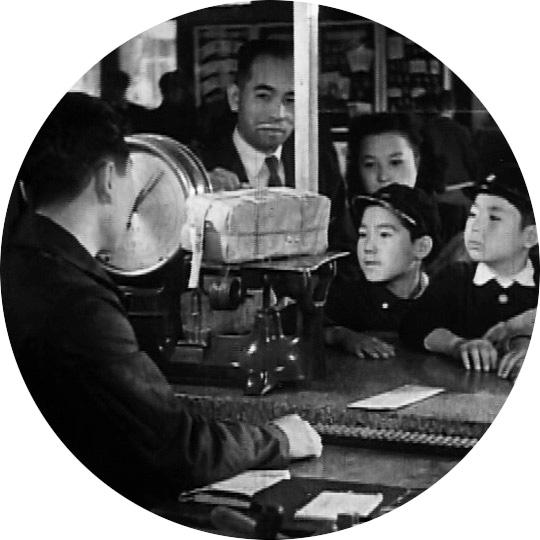Documentary Film Screening “Japan Rediscovered – Tokyo”
2013.11.01
ACADEMIA
Date & Time: Friday, November 1st, 2013 6:00 p.m. (expected to end at 7:30 p.m.)
Venue: Intermediatheque 2F Lecture Theatre ACADEMIA
Admission free
Language: Japanese (no subtitles)
The number of seats is limited to 48. We request your comprehension.
From November 1 on, a cycle of documentary film screenings entitled “The Archaeology of Image” will be held within the lecture theatre ACADEMIA of the Intermediatheque. The first series of documentary films to be shown in the context of this cycle is “Japan Rediscovered.”
From 1961 unto the following year, the educational series “Japan Discovered” presenting each region of Japan was broadcast on Nihon Educational Television. Produced by Iwanami Film Production Co., the series was filmed by major directors of the era, and offers a sociologic perspective on postwar Japan as it undergoes rapid economic growth. This is not to say that the series is simply an outdated educational material. Not only is it characterized by calm but poetic narration, as well as experiments on framing and editing which are common to the feature films of the same era, but it also offers a unique portrait of Japan at the time. The particularities of each region, but also the faces of the Japanese before they underwent globalization, and the landscapes of Japan as it is transformed by industrialization, are admirably recorded.
Starting in 1957 and for ten years, artist Taro Okamoto traveled Japan as it underwent rapid economic growth, visiting sites of memory representative of Japan, in the continuation of his quest for what he saw as Japanese traditions. He collected the photographs he took then, accompanying them with his own texts, and eventually published Japan Rediscovered. This series of documentary films constituting the first episode of our “Archaeology of Image” cycle is precisely Japan Rediscovered in its filmic version.
Organization: The University Museum, the University of Tokyo + Centre for the Conservation of Documentary Film
Cooperation: Yoshimi Laboratory, Interfaculty Initiative in Information Studies, the University of Tokyo
Program Conception: Intermediatheque Department, The University Museum, the University of Tokyo
【Screened Films】
“Educational Films for Social Studies: the Post”
1951 / 19 min 23 sec / digital version of original 16mm film / BW
Produced by Naigai Film Co. / Producer: Hideo Kamo / Director: Genichiro Higuchi / Camera: Seiichi Kizuka
“Tokyo” (1) (From the Japan Discovered series)
1962 / 29 min / digital version of original 16mm film / BW
Produced by Iwanami Film Production Co. / Producer: Takeji Takamura / Director: Noriaki Tsuchimoto / Scenario: Junpei Yoshihara / Camera: Yuji Okumura
“Tokyo” (2) (From the Japan Discovered series)
1962 / 28 min / digital version of original 16mm film / BW
Produced by Iwanami Film Production Co. / Producer: Takeji Takamura / Director: Yoichi Kagami / Scenario: Junpei Yoshihara / Camera: Katsushi Tamura
The documentary films from the Japan Discovered series which will be screened this time are both entitled Tokyo. But why produce on demand two different versions of the first episode of a documentary series? In fact, Noriaki Tsuchimoto’s Tokyo was rejected and consequently not broadcast. Yoichi Kagami filmed another take, which was finally adopted. This screening will thus provide the opportunity to compare, in two different renditions, a portrait of Tokyo facing a turning point as it undergoes rapid economic growth just before welcoming the Olympic Games.
To inaugurate the “Archaeology of Film” series, we will first screen “The Post”, a short educational film produced in 1951. This film presenting postal activities through the exchange of letters and parcels between pupils from Tokyo and from the provinces offers views of the former Tokyo Central Post Office building and its second and third floors as they were used then. It is thus a precious film document when considering the history of the Intermediatheque, which is now housed here.
【On “The Archaeology of Image”】
Since the invention of film, a colossal amount of documentary images ranging from educational films to news programs have been produced. Nowadays, these are instantly reproduced, edited and shared, as if this were an evident process. However, as far as their conservation and access to the public are concerned, the images constituting this colossal documentary corpus have not been treated equally. Among them, historical images everyone has seen form a tiny minority, and most documentary films have now fallen into oblivion. One of the main reasons accounting for this is the fact that most films having been commissioned, they were neglected or even destroyed just like consumable goods, once their initial function was fulfilled.
As far as it activates objects from the past in order to produce new interpretations for the future, this cycle of projections is particularly significant. By excavating, collecting, preserving and digitalizing film which records human activity throughout the 20th Century, and by showing it to the public, we can preserve part of the colossal image heritage in danger of extinction. At the same time, through documentary films diverging from the mainstream images we have been used to watch, we can reevaluate the evolution of 20th-Century Japan.
The Intermediatheque constantly produces new resources by preserving and reevaluating academic heritage in all its diversity, from scientific specimens to furniture, part of it was abandoned. For images alike, through an archaeological excavation of a corpus which is a trove of filmic memories of the 20th Century, we expect new discoveries.
The present cycle of projections will be held regularly, with the cooperation of the Centre for the Conservation of Documentary Film.

